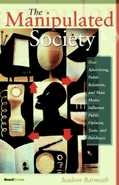|
|
|
|
||||||

|
The Manipulated Society: How Advertising, Public Relations, and Mass Media Influence Public Opinion, Taste, and Purchases This compelling book vividly illustrates that oversell, hypocrisy, and deception are being practiced daily against millions of Americans, in many cases inducing them to respond to the wrong things for the wrong reasons because of the wrong stimuli. Publisher Comments
When this book was first published as The World is full of It in 1974, it was one of the most widely discussed and hotly debated books of the year. In an age of instant, electronic, and computerized communications, Barmash's analysis of public manipulation by commercial-driven subterfuges is even truer today that it was then. Isadore Barmash has launched a full-scale attack on the communications manipulators in government, business, and entertainment with deadly accuracy and wit. At the same time, he has leveled equally devastating blasts against omni-present public relations and promotions practitioners. From Henry Berry, Turnarounds and Workouts, December 15, 2005: Most other books on the inter-related subjects of how organizations and individuals manipulate the media to create distorted images and accomplish questionable ends treat these at a superficial level or almost as a form of light, popular entertainment. The books take varied examples of such media stories and images and compare what was reported or the images created with true circumstances of the respective matter or person. These books are more or less simple analyses of how the manipulation occurred, and they serve as cautionary tales to the public about accepting all that they read or see in the media. Barmash's "The Manipulated Society," by contrast reaches to a deeper level than these other books. Their aim is for individuals to develop a skepticism and certain defensiveness with respect to the skilled, dubious, and often unnoticeable manipulation, so individuals will not be adversely affected by it. But this merely leaves an artificial situation involving the perpetrator of the manipulation, the media, and the public. Most other books connote that if the public realizes the manipulation that is going on, the public, and society, is sufficiently safeguarded. The manipulation has been rendered harmless. But with a keen moral sense, Barmash takes the case farther than this. Barmash is concerned not only with how the media is being manipulated by public-relations people, advertisers, various "spokespersons" and "talking heads" in the service of corporations, politicians, celebrities, and other figures who seek public attention or are thrust into it, but also with the effects of this on basic social values and the subsequent fraying of the social fabric necessary to keep the country strong and united. "In a word, we are losing are values because our values are being manipulated by others with specific, ulterior motives." The "callousness" being formed in the public--the skepticism or defensiveness urged by other critics--leads to "an almost complete loss of credibility in not only all our communications' elements but also in the various institutions of American society." This loss of credibility in central institutions such as government bodies and large corporations is the more serious effect of the manipulation of the media Barmash concentrates on which most other media and social critics stop short of dealing with. To illustrate the disorienting and corrupting effects of the media manipulation whether it is uncritically taken in or commonly accommodated when it is recognized, in places Barmash uses the simple but effective technique of devising representative individuals and putting them into familiar situations. Readers will recognize themselves in these situations, which are like short scenes in a TV drama or soap opera. By seeing their behavior, talk, and thoughts along with the author's commentary on these, readers see what Barmash means by saying that basic values are being jeopardized. "A young man between the ages of twenty-two and twenty-eight" deciding to get married is one such representative character. A mother with a young child is another. Along with such imaginary characters, Barmash relates anecdotes or interviews with actual persons in journalism, public relations, and other areas of the media. It is mainly by these techniques using recognizable imaginary individuals and also familiar individuals in the fields he is dealing with that Barmash persuasively makes his central point about the relationship between the ubiquitous manipulation of the media and the effects of this in the lives of individuals. If anything, "The Manipulated Society" is more relevant today than when it was first published in 1974. Barmash's examples are still familiar, though the names of the corporations and politicians have changed. Barmash's analyses are seen as models for revealing the media manipulations that have been followed by many other critics. The manipulations Barmash spoke against have become even more sophisticated. Some big media today are seen by many not only as being manipulated, but as willing partners of those doing the manipulating. Thus Fox News is seen as more or less a house organ of the Bush Administration; and PBS is seen as a platform of liberals. Yet despite the familiarity of the media and social issues Barmash was one of the first to specify and criticize almost three decades ago and the greatly increased influence of the media, "The Manipulated Society" still stands out for the clarity and depth of its analysis of the media manipulation running through modern society. Isadore Barmash has been a business and financial writer for the "New York Times" for over twenty-five years; and has also written in these areas for other domestic and international publications.
|
|
|
|
home
| about
us | contact
us | related
sites |